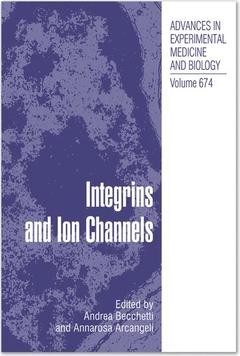Description
Integrins and Ion Channels, 2010
Molecular Complexes and Signaling
Advances in Experimental Medicine and Biology Series, Vol. 674
Coordinators: Becchetti Andrea, Arcangeli Annarosa
Language: English
Keywords
activation; antibody; biology; cancer; cell; development; ion channels; membrane; migration; proliferation; protein; proteins; regulation; signal transduction; tissue
Publication date: 05-2012
124 p. · 15.5x23.5 cm · Paperback
Publication date: 04-2010
124 p. · 15.5x23.5 cm · Hardback
Description
/li>Contents
/li>Biography
/li>Comment
/li>
ANDREA BECCHETTI, PhD, is Professor of General, Comparative and Cellular Physiology at the Department of Biotechnology and Biosciences of the University of Milano-Bicocca, Italy. After receiving his academic degrees at the University of Milan, he has spent prolonged research sojourns at the Department of General Pathology of the University of Florence, Italy, the Department of Physiology at Emory University in Atlanta, Georgia, USA, the Department of Physiological Sciences of the University of Newcastle upon Tyne, UK, and the Biophysics Sector of the International School for Advanced Studies (ISAS-SISSA), in Trieste, Italy.
His current research interests include the role of ion channels in cell adhesion and proliferation, the nicotinic modulation of synaptic transmission in the mammalian cerebral cortex and the pathogenesis of sleep-related epileptic forms linked to mutant human nicotinic receptors. Andrea Becchetti is member of the Society of General Physiologists, Biophysical Society, Society for Neuroscience and the Italian Physiological Society.
ANNAROSA ARCANGELI, MD, PhD is Professor of General Pathology and Immunology at the Department of Experimental Pathology and Oncology of the University of Firenze (Florence, Italy). She is the Scientific Director of the Laboratory of Genetic Engineering for the Production of Animal Models of the University of Firenze. After receiving her MD degree at the University of Firenze, she spent several research sojourns at the Department of Physiology of the University of Milano, at the Institut d’Embriologie Cellulaire et Moleculaire, Nogent sur Marne, Paris, France and at the MRC-LMB Centre of Cambridge, UK. Her main research interests include the role of ion channels, in particular potassium channels, in the regulation of different aspects of tumor cell behaviour, including the cross talk with adhesion receptors, as well as the identification of ion channels as novel targetsfor c




